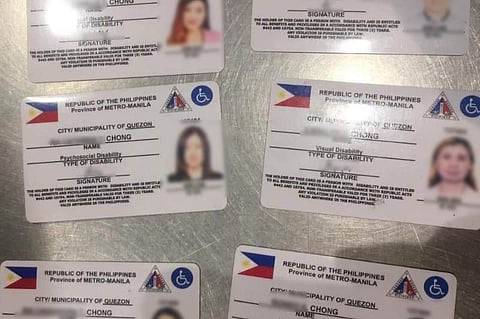
- NEWS
- the EDIT
- COMMENTARY
- BUSINESS
- LIFE
- SHOW
- ACTION
- GLOBAL GOALS
- SNAPS
- DYARYO TIRADA
- MORE

For years, persons with disabilities (PWDs) in the Philippines have carried various identification cards from different local government units, making access to benefits inconsistent and, at times, frustrating. But soon, a long-awaited change will take shape as the National Council on Disability Affairs (NCDA) rolls out its pilot test for a unified identification system across 35 areas nationwide.
This pilot program aims to issue both physical and digital ID cards to around 200,000 PWDs, starting in July.
NCDA Executive Director Glenda Relova said in a recent radio interview that the program responds to two key challenges: combating fake IDs and streamlining government support for PWDs.
“Number one is sino yung maraming proliferation noong fake IDs. Pangalawa po, [nagtawag] si NCDA ng mga municipalities who want to participate, at sila po yung nagbigay ng intent na makasali sa ating pilot testing,” Relova explained.
The NCDA, an attached agency of the Department of Social Welfare and Development (DSWD), leads efforts to formulate policies, coordinate programs, and advocate for the welfare of persons with disabilities in the country. This unified ID project is one of its most significant undertakings in recent years.
The selected pilot areas span the country’s major regions, with a mix of urban and rural localities. Among them are Parang in Maguindanao from the Bangsamoro Autonomous Region in Muslim Mindanao; several cities in Pangasinan, including Dagupan, San Carlos, Urdaneta, and Alaminos; Solano in Nueva Vizcaya; municipalities in Bulacan; and several towns and cities in Rizal province such as Cainta, San Mateo, Santa Rosa, Teresa, and Antipolo.
Other identified sites include Carmona in Cavite, Pila in Laguna, Daet in Camarines Norte, Kalibo in Aklan, Candijay in Bohol, Malaybalay in Bukidnon, Koronadal City and Surallah in South Cotabato, as well as Pasay and Muntinlupa in Metro Manila.
The physical IDs will be advanced RFID-enabled PVC cards with built-in security features to prevent counterfeiting and ensure safe offline transactions. The digital version, meanwhile, will be accessible via a mobile app or web platform, featuring QR codes for instant verification.
Director Relova emphasized that the local government units, through their Persons with Disability Affairs Offices (PDAOs), will remain in charge of application processing and verification at the community level.
“The application, verification, and approval process for the unified ID will still be under the local government units (LGUs) through their respective Persons with Disability Affairs Offices (PDAO),” she said.
As the lead agency, the DSWD will handle the centralized printing and design of the cards, ensuring that all issued IDs follow the same standards.
